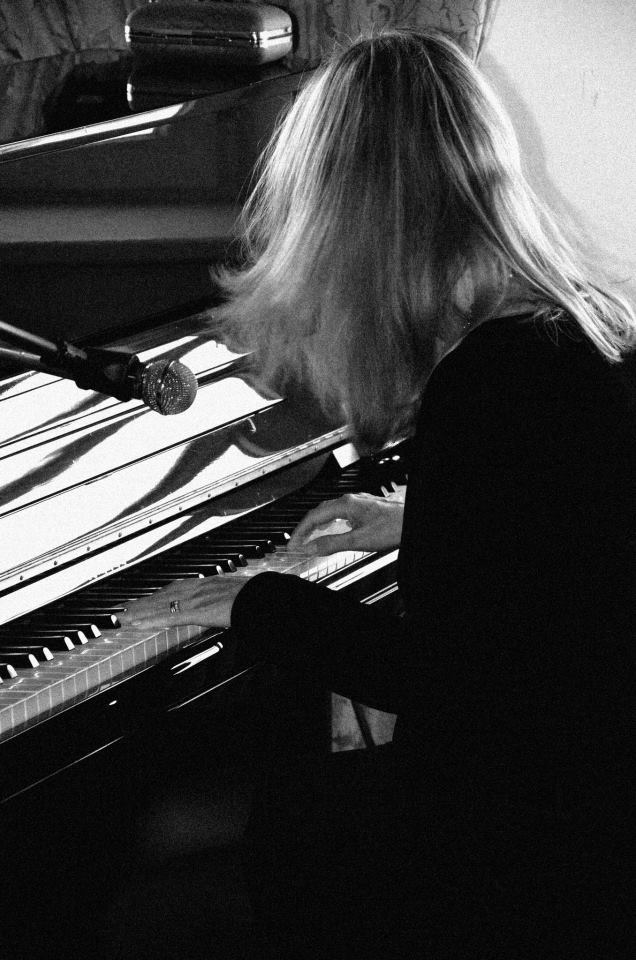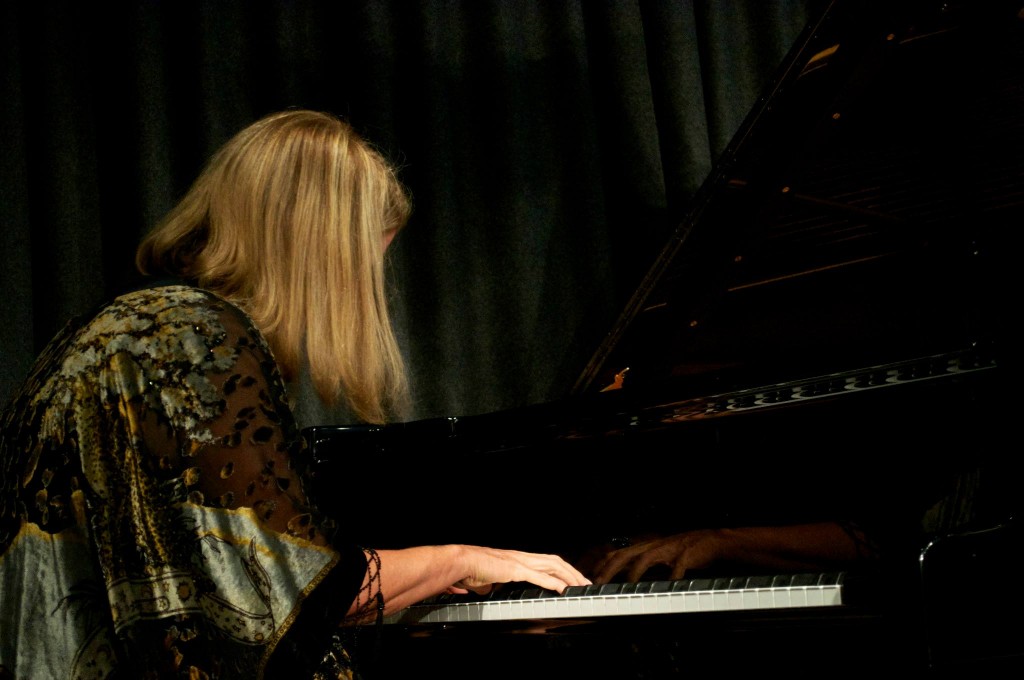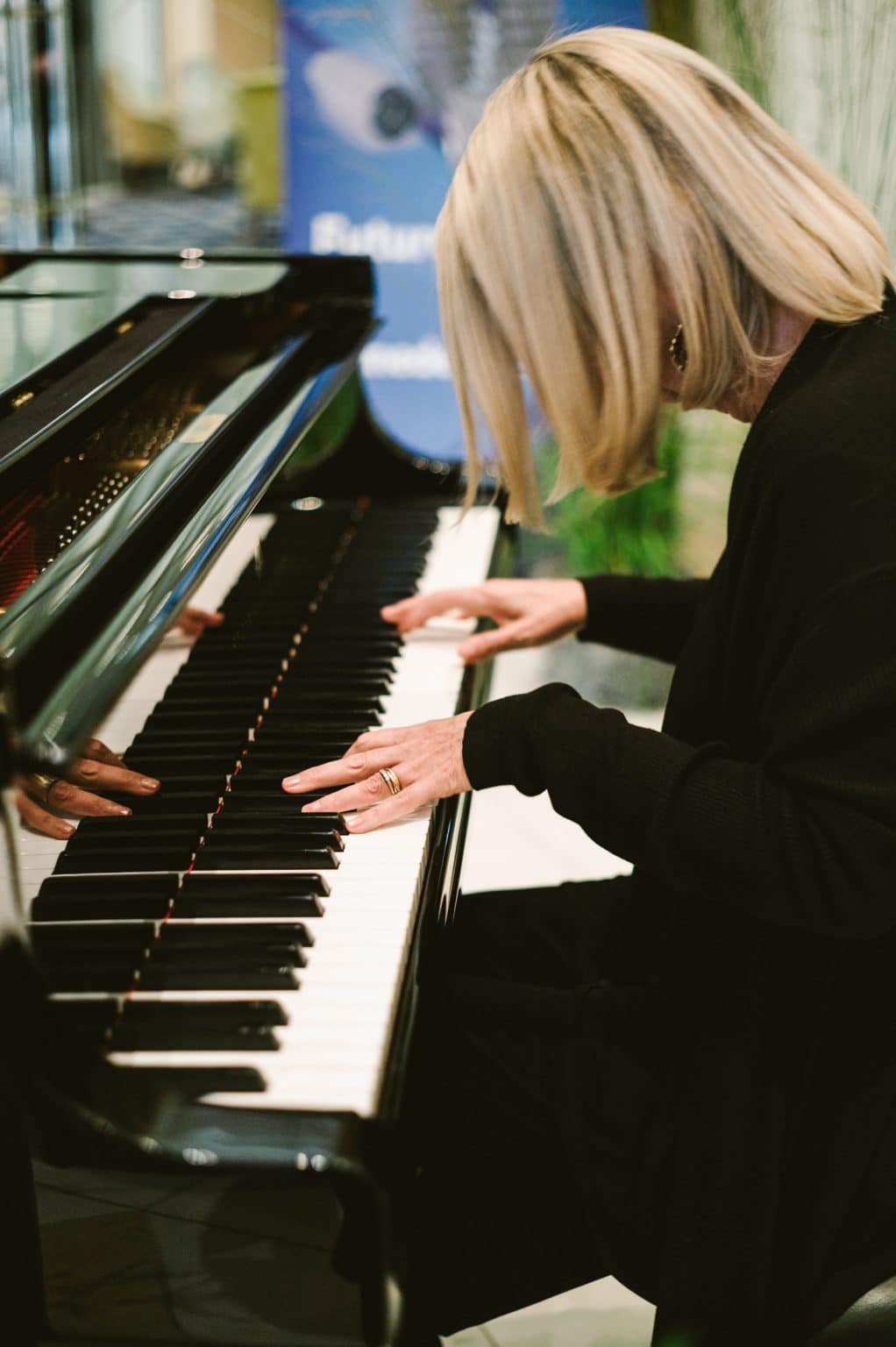
It’s not always a Steinway. Sometimes it’s an ugly-looking, beautiful-sounding white Bösendorfer concert grand or a Yamaha conservatory grand with a high-gloss mirrored surface, so polished that I can see the mood of the evening staring back at me. Sometimes the instrument I play barely qualifies as a piano. Sometimes it’s an Army-surplus spinet made by a firm that is a subsidiary of a toy company. Sometimes it’s a beat-up upright piano with four broken strings—and when I press a key I can hear several distinct tones fluttering together and laughing at me with their out-of-tuneness. Sometimes it really is the perfect Steinway Model B, a seven-foot grand with a sound warm enough to make me stay at the piano forever, just listening. I play. I make music. I am the tall blond woman in the strapless cocktail dress, and I sit in the corner and play the piano.
I didn’t set out to be a cocktail pianist. But here I am, wearing something black, a little eyeliner, a little lipstick, high heels. I’m not Shirley Horn, or Diana Krall, or Marian McPartland, or Bobby Short in a blond wig. Not even close. But I work all the time and I’m pretty good at what I do.
There are many terms for my profession. I am called a cocktail pianist, a bar pianist, a hotel pianist, and a lounge pianist. I perform background music that enhances a dinner, a lunch, a chilled prosecco; or atmosphere music meant to embellish a business meeting, a wedding, an illicit affair—without getting in the way. I play music that is comforting, gentle enough to pacify, melodic enough to nudge my audience into the folds of their own memories.
I’ve spent many years underestimating the validity of my job. I’m not really a bar pianist, I tell myself, because I want to be more than that. I’m a student. I’m an actor. I’m a writer. I’m a composer. I’m a single woman living in New York City standing on the edge of a nervous breakdown. I’m a citizen of the world. I’m happy. I’m a mother. I’m a wife. I’m all of these things, true, true, true. But I’m able to be all of these things because playing the piano in a hotel continues to pay the bills. Now, with the wisdom of a maturity that was bound to catch up with me, I realize that being a cocktail pianist is a lovely way to make a living. It started out as a way to earn money for college. It ended up being my profession for thirty years and counting.
I play medleys of great songs and obnoxious songs and make them all sound, well, nice. Plus I’ve been questionably blessed with the ability to be polite, to smile, and to remember the first names of the customers who stray into the joints where I’m playing. These days, some of the joints are castles in Europe. I’ve traveled a long way from the Nantucket Club Car and the Redwood Motor Inn on Banksville Road in Pittsburgh where I had my first steady gigs as a teenager, but basically the scene is the same. Fancier clothes, slightly better piano, same ratio of lunatics to normal people. I play.
Sometimes I’m treated like visiting royalty from a mysterious land, flown to the job in a private jet, showered with roses, fine wine, and compliments from people whose pashmina socks cost more than my entire wardrobe. Sometimes I feel like a frazzled waitress with eighty-eight keys strapped around my neck, taking orders from drunken shoe salesmen who would prefer to see me go-go dance in a green fringed bikini on top of the piano rather than make any sense out of the instrument in front of me.
Every job presents the chance to be a musical fly on the wall—providing a piano score for life as it’s served, straight-up with a side of olives, to the droves of people who pass through the world’s bars and restaurants. Over the years I’ve been appalled, attacked, blown away by kindness, cajoled into fits of giggles, and moved to tears by the tiny dramas that unfold before my eyes and ears. I cry. I laugh. Laughter is a kind of music—the best kind. I’ve always wanted to write the score for a film. But maybe this is better. I’m writing and playing music for life, as it happens. It’s like recording live on tape, without the tape.
One day I’m eighteen years old, sitting down to play my first job. Startled, I wake up on a bright spring morning and realize that I’m forty-six, and that my entire adult life can be documented by a series of forty-minute sets and twenty-minute breaks. I fret about missed opportunities—how I’ve spent the peak years of my life behind an instrument that fights back more often than it complies with my wishes—and the way real time slips away from me like runaway triplets at a children’s piano recital.
I have moments of artistic satisfaction. Many of them. On a typical night—in between requests and idle chit-chat with guests from, say, Helsinki, or Bogata, or Hackensack—I play the music that I want to play, the way I want to play it. I feel peaceful, exhilarated, and sure that I’ve chosen the right profession. It’s almost a magical feeling, and I allow it to sweep me away. Then some drunk-on-his-ass sales rep from a surgical supply company sends me a cocktail napkin with a request for “Memory” from Cats, a twenty-dollar bill, and—as an afterthought—his room number. I check out the man who has sent the note. He is sprawled on the burgundy velvet banquette, smoking a cigar and drinking a brandy. He looks like a cross between a sloth and a walrus. I play the song, keep the money, and make sure a taxi is waiting for me at quitting time.
I go home, slightly amused, a little disgusted. But I come back the next day to play again. In fact, I look forward to it. The smells of cigarette smoke, grilled steak, and too much Chanel No. 5 waft in my direction like a big cloud of fairy dust blown in from a distant yet familiar planet. I sit at the piano. The customers briefly acknowledge my presence, then resume talking. It’s time for my first set. I place my hands on the instrument, not quite sure what to play. I never know what the first song will be until exactly this moment. In front of me is a maze of ebony and ivory, but I don’t see the keys anymore. I see the faces of 30 years of guests, friends, bartenders, and waiters morphing into an impressionistic canvas of something remarkable.
So I play a song to remember.

Piano Girl excerpt courtesy of Backbeat Books/Hal Leonard. Robin Meloy Goldsby is a Steinway Artist. She is also the author of Piano Girl; Waltz of the Asparagus People: The Further Adventures of Piano Girl; and Rhythm: A Novel.
Coming soon: Manhattan Road Trip, a collection of short stories about (what else?) musicians.
Sign up here to receive Robin’s monthly newsletter. A new essay every month!
